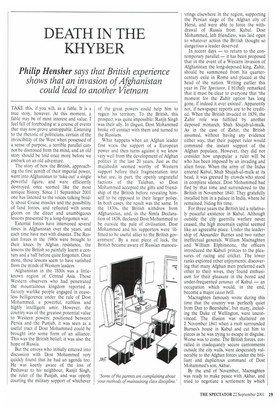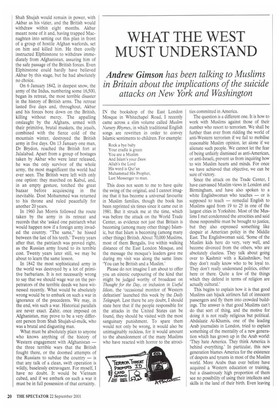DEATH IN THE KHYBER
Philip Hensher says that British experience
shows that an invasion of Afghanistan could lead to another Vietnam
TAKE this, if you will, as a fable. It is a true story, however, At this moment, a fable may be of most interest and value. I feel full of foreboding at a course of events that may now prove unstoppable. Listening to the rhetoric of politicians, certain of the invincibility of the West when possessed of a sense of purpose, a terrible parallel cannot be dismissed from the mind, and an old story should be told once more before we embark on an old adventure.
The story of how the British, approaching the first zenith of their imperial power, went into Afghanistan to 'take out' a single powerful figure, and were efficiently destroyed, once seemed like the most antique history. Since 11 September 2001 one has listened to the voices talking boldly about Cruise missiles and the possibility of land forces, and reflected with some gloom on the direct and unambiguous lessons presented by a long-forgotten war.
External forces have intervened several times in Afghanistan over the years, and each time have met with disaster. The Russian forces in the 1980s were brought to their knees by Afghan resistance, the lessons the British so painfully learnt a century and a half before quite forgotten. Once more, those lessons seem to have vanished from the minds of Western leaders.
Afghanistan in the 1830s was a littleknown region of Central Asia. Those Western observers who had penetrated the mountainous kingdom reported a fiercely warlike people engaged in ceaseless belligerence under the rule of Dost Mohammed, a powerful, ruthless and highly intelligent amir. However, the country was of the greatest potential value to Western powers: positioned between Persia and the Punjab, it was seen as a useful tract if Dost Mohammed could be brought into some form of an alliance. This was the British belief; it was also the hope of Russia.
But the envoys who initially entered into discussion with Dost Mohammed very quickly found that he had an agenda too. He was keenly aware of the loss of Peshawar to his neighbour, Ranjit Singh, the ruler of the Punjab, and was openly courting the military support of whichever of the great powers could help him to regain his territory. To the British, this prospect was quite impossible: Ranjit Singh was their ally. In disgust, Dost Mohammed broke off contact with them and turned to the Russians.
What happens when an Afghan leader first woos the support of a European power and then turns against it we know very well from the development of Afghan politics in the last 20 years. Just as the mujahedin seemed worthy of Western support before their fragmentation into what are, in part, the openly ungrateful factions of the Taleban, so Dost Mohammed accepted the gifts and friendship of the British before revealing himself to be opposed to their larger policy. In both cases, the result was the same. In the 1830s, the British withdrew from Afghanistan, and, in the Simla Declaration of 1838, declared Dost Mohammed to be outside the pale of civilisation. Dost Mohammed and his supporters were 'illfitted to be useful allies to the British government'. By a neat piece of luck, the British became aware of Russian manoeu vrings elsewhere in the region, supporting the Persian siege of the Afghan city of Herat, and were able to force the withdrawal of Russia from Kabul. Dost Mohammed, left friendless, was laid open to whatever action the British thought so dangerous a leader deserved.
In recent days — to return to the contemporary parallel — it has been proposed that in the event of a Western invasion of Afghanistan the long-deposed king, Zahir, should be summoned from his quartercentury exile in Rome and placed at the head of the nation. Writing earlier this year in The Spectator, I blithely remarked that it must be clear to everyone that 'the moment for the Zahir option has long gone, if indeed it ever existed'. Apparently not, if newspaper reports are to be credited. When the British invaded in 1839, the Zahir role was fulfilled by another deposed monarch, Shah Shujah-ul-mulk. As in the case of Zahir, the British assumed, without having any evidence either way, that their puppet ruler would command the instant support of the Afghan populace. However, they did not consider how unpopular a ruler will be who has been imposed by an invading and alien force. When the army of the Indus entered Kabul, Shah Shujah-ul-mulk at its head, it was greeted by crowds who stood in complete silence. Dost Mohammed had fled by that time and surrendered to the British in November 1840. They gratefully installed him in a palace in India, where he remained, biding his time.
For three years the British led a relatively peaceful existence in Kabul. Although outside the city guerrilla warfare never ceased, the high mountain capital seemed like an agreeable place. Under the leadership of Alexander Burnes and two rather ineffectual generals, William Macnaghten and William Elphinstone, the officers introduced the Kabuli princes to the pleasures of racing and cricket. The lower ranks explored other enjoyments: discovering that many Afghan men preferred each other to their wives, they found enthusiasm for their pleasure in the bored and under-frequented zenanas of Kabul — an occupation which would, in the end, become a major casus belli.
Macnaghten famously wrote during this time that the country was 'perfectly quiet from Dan to Beersheba', but many, including the Duke of Wellington, were unconvinced, The illusion was shattered on 2 November 1841 when a mob surrounded Burnes's house in Kabul and cut him to pieces as he was trying to escape in disguise. Worse was to come. The British forces, corralled in inadequately secure cantonments outside the city walls, were desperately vulnerable to the Afghan forces under the brilliant and duplicitous command of Dost Mohammed's son, Akbar.
By the end of November, Macnaghten was ready to make peace with Akbar, and tried to negotiate a settlement by which Shah Shujah would remain in power, with Akbar as his vizier, and the British would withdraw within eight months. Akbar meant none of it and, having trapped Macnaghten into setting out this plan in front of a group of hostile Afghan warlords, set on him and killed him. He then coolly instructed Elphinstone to withdraw immediately from Afghanistan, assuring him of the safe passage of the British forces. Even Elphinstone could hardly have believed Akbar by this stage, but he had absolutely no choice.
On 6 January 1842, in deepest snow, the army of the Indus, numbering some 16,500, began its retreat, the most terrible disaster in the history of British arms. The retreat lasted five days and, throughout, Akbar and his forces bore down on the British, killing without mercy. The appalling onslaught by the Afghans, armed with their primitive, brutal muskets, the jezails, combined with the fierce cold of the mountain winter, destroyed the British army in five days. On 13 January one man, Dr Brydon, reached the British fort at Jalalabad. Apart from a group of hostages taken by Akbar who were later released, he was the only survivor of the whole army, the most magnificent the world had ever seen. The British were left with only one option: they marched on Kabul, and, in an empty gesture, torched the great bazaar before acquiescing in the inevitable. Dost Mohammed was returned to his throne and ruled peacefully for another 20 years.
In 1960 Jan Morris followed the route taken by the army in its retreat and records that she 'asked one patriarch what would happen now if a foreign army invaded the country. "The same," he hissed between the last of his teeth.' Twenty years after that, the patriarch was proved right, as the Russian army found to its terrible cost. Twenty years later still, we may be about to learn the same lesson.
In 1842 the most sophisticated army in the world was destroyed by a lot of primitive barbarians. It is not necessarily wrong to say that we should wage war on the perpetrators of the terrible deeds we have witnessed recently. What would be absolutely wrong would be to embark on such a war in ignorance of the precedents. We may, in the end, win such a war. Historical parallels are never exact. Zahir, once imposed on Afghanistan, may prove to be a very different person from Shah Shujah-ul-mulk, who was a brutal and disgusting man.
What must be absolutely plain to anyone who knows anything of the history of Western engagement with Afghanistan — the three terrible wars that the British fought there, or the doomed attempts of the Russians to subdue the country — is that any talk of a clean, swift operation is wildly, baselessly extravagant. For myself, I have no doubt. It would be Vietnam cubed, and if we embark on such a war it must be in full possession of that certainty.











































































 Previous page
Previous page